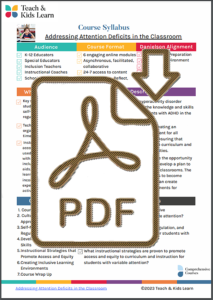An Introduction to Social
Emotional Learning (SEL), Grades K-12
Course Description
 |
This course on social-emotional learning (SEL) will provide educators with the knowledge and skills necessary to support the social-emotional development of their students effectively.
The course will cover the critical components of SEL, including self-awareness, self-management, social awareness, relationship management, and responsible decision-making. |
Educators will learn about the importance of SEL in promoting positive academic and social outcomes for students. They will also explore strategies and activities to support SEL in the classroom.
In addition, the course will examine the role of the teacher in promoting SEL, including the importance of modeling positive social-emotional behaviors and creating a supportive and inclusive learning environment.
Throughout the course, educators will have the opportunity to reflect on their teaching practices and develop a plan for incorporating SEL into their classrooms. The goal of the course is to empower educators to become confident and competent educators who can support the social-emotional development of all students.
Essential Questions
- What is the relationship between social-emotional learning and academic outcomes?
- How do educators model positive social-emotional behaviors and build relationships with students?
- What are the best strategies for teaching social-emotional skills and concepts to students?
Course Modules
|
| Course Syllabus |
|
Comments from Teachers
“Schools need more practice when it comes to social-emotional learning. Students need it more than ever. The strategy that I will implement into my practice is encouraging my Pre-K students to express their emotions and feelings in the classroom by praising them when they talk about their feelings or express them in an appropriate way. It shows that feelings are normal and it’s ok to talk about them, but it also reinforces the behavior, so they are likely to repeat it. I will also involve the class as a large group to collaborate and discuss possible positive coping strategies to use when feeling different emotions.”
“I value the overall experience with Teach & Kids Learn (TKL) and find the courses very useful for me to improve my teaching practice.
Danielson Teacher Framework Course Alignment


